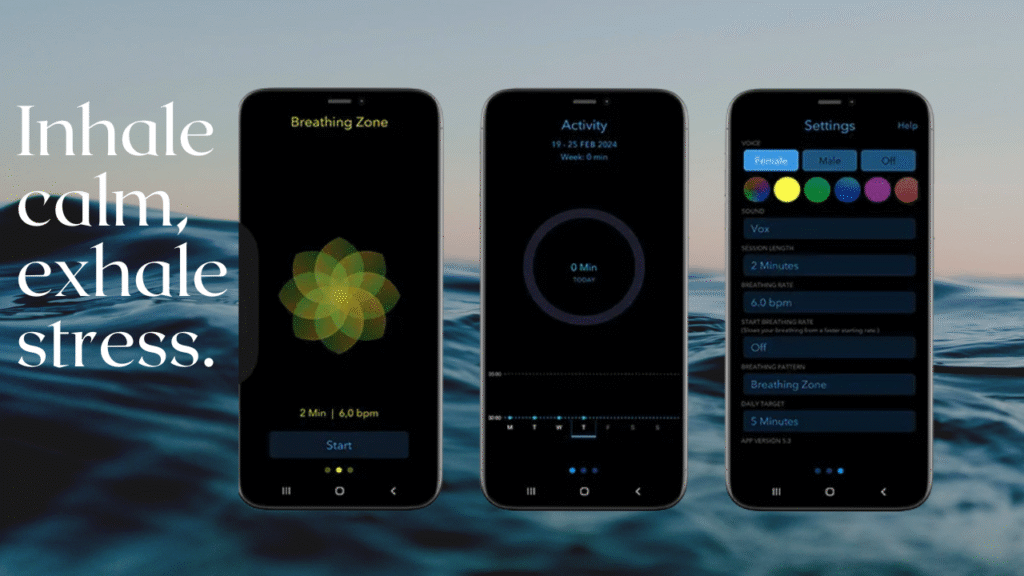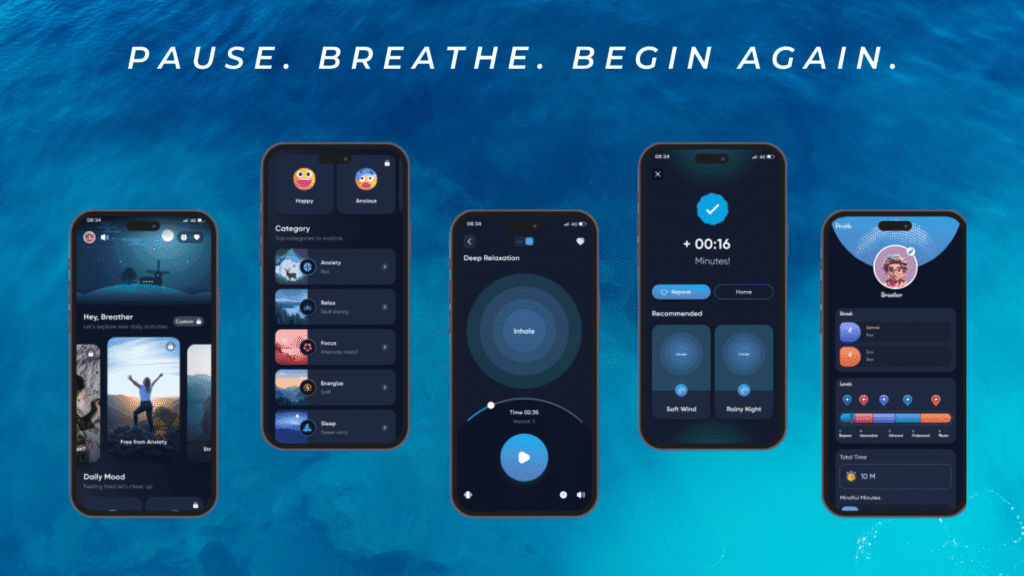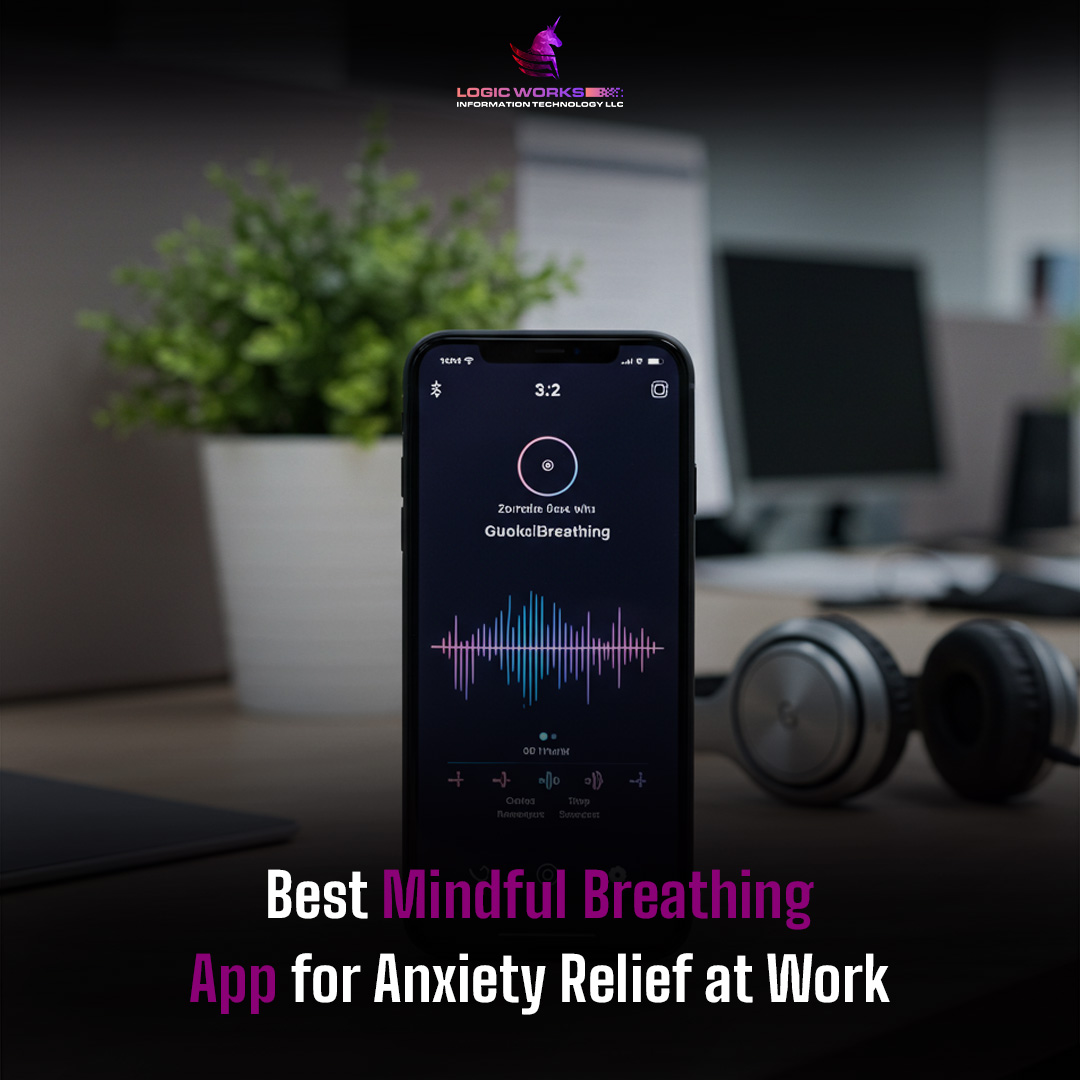Work can be stressful. Emails piling up. Deadlines that don’t stop. Meetings that eat into your focus. It’s no wonder workplace anxiety is on the rise. For many of us, stress doesn’t just fade; it follows us through the day.
Good news: A calmer you can achieve right at your desk. A few minutes of a mindful breathing app can be your on-the-spot reboot. By leading your breath in, out, slow, steady these apps soothe your nervous system and give your attention back. They are like a small reboot when the pile of problems at work becomes too much.
This handbook will teach you the effectiveness of mindful breathing, the features of a good app, the instructions of a work session, and the names of the leading apps. If you’re searching for the best mindful breathing app for anxiety relief at work, this is for you.
Why Mindful Breathing Helps with Anxiety at Work
When you’re stressed, your body goes into “fight or flight.” Your heart races. Your breathing gets shallow. Cortisol (the stress hormone) shoots up. Not great for focus or calm.
Mindful breathing flips the switch. It activates the parasympathetic nervous system the “rest and digest” response. That means:
- Heart rate slows down
- Blood pressure steadies
- Mind clears up
In a high-powered environment, this is quite effective. Definitely think about you leaving a stressful meeting, and calming yourself down in the shortest possible time – three minutes with your phone and headphones only no therapy session needed.
It’s not just the word of the author, though. The scientific evidence is that breathing exercises to lower cortisol, lessen anxiety, and increase concentration. This is akin to a stress-management secret that you can have in your pocket.
And the best part? You don’t need 30 minutes of silence or a yoga mat. Mindful breathing at work can fit into:
- A coffee break
- The five minutes before a big presentation
- Even those moments when your inbox just won’t quit
That’s why breathing apps are gaining traction. They make mindfulness practical for real people with real jobs.

What to Look for in a Mindful Breathing App
Not every app is built for the workplace. Some are great for bedtime, others for long meditations. But if you want something that works between meetings, here’s what matters most:
1. Guided Breathing Exercises
Look for apps that actually guide you with audio, visuals, or timed cues. Example: “Inhale for 4… Hold for 7… Exhale for 8.” That way, you don’t overthink it. Just follow along.
2. Customizable Features
Stress isn’t one-size-fits-all. Some days you’ll need two minutes. Other days, maybe ten. Choose apps that let you:
- Adjust session length
- Set your own pace
- Save favorite patterns
Customization keeps it useful, not frustrating.
3. Ease of Use
You don’t want a clunky app with endless menus. The best ones open fast and guide you straight into a session. Bonus points if it works quietly at your desk.
4. Integration with Work Routine
Reminders help. Silent modes help even more. A tool that alerts you to take a break silently is extremely valuable.
The concept is just this: the most effective meditation apps scarcely come to your mind when you are engaged, but once you realize you need them, they are there, waiting to serve you.
Step-by-Step: Using a Mindful Breathing Application at Work
What to do after you download an app? Here is the guide to the effective usage of it.
Step 1 – Download and Set Up
Try Headspace, Calm, or Breathwrk if you’re not sure where to start. After the download, follow the prompts to create an account and complete the setup (like an average day, or what stress you). The app uses the data to customize your sessions.
Step 2 – Customize Your Breathing Sessions
Choose the duration of your session that is realistic and that you can stick to. You can do 3 to 5 minutes for the work session which is enough. The breathing rate should be adjusted to a level which feels natural and not forced. For example, if you usually get stressed at noon, then set the time of notification around noon.
Step 3 – Use It in Stressful Moments
What if the boss calls a meeting that you didn’t know about? A major deadline is just around the corner. In such situations, it is time for you to open the app, put your headphones on and let the guided breathing take over. The 4-7-8 pattern (inhale 4, hold 7, exhale 8) is one of the quickest ways to relax your nerves.
Step 4 – Track Your Progress
Most of the apps will record your sessions. After some time, you will be reading the patterns that will appear e.g. stress peak hours or sleep improvement due to short sessions. To be inspired is one of the benefits of noticing the progress made.
Step 5 – Make It a Habit
Don’t save breathing only for crises. Pair it with daily routines:
- One session after lunch
- One before tackling emails
- One during your afternoon slump
Start small once a day. Then increase as it becomes part of your rhythm.

Best Mindful Breathing Apps for Anxiety Relief at Work
Here are a few standout apps worth trying:
Headspace
One of the most well-known. Headspace isn’t just meditation it includes guided breathing specifically for stress. The sessions are short, calm, and office-friendly.
- Pros: Polished design, beginner-friendly, strong science backing
- Cons: Subscription needed for full library
Calm
Calm lives up to its name. It has breathing tools plus extras like relaxing music and soundscapes. Great if you want more variety.
- Pros: Lots of content, workplace-friendly sessions
- Cons: Premium version can be pricey
Breethe
Designed for busy people. Breethe focuses on quick, bite-sized sessions you can squeeze in between calls.
- Pros: Affordable, fast sessions
- Cons: Smaller content library
Breathwrk
This one specializes purely in breathing. You can pick from patterns like energizing, calming, or focus-building. Perfect for customizing exactly what you need.
- Pros: Simple, targeted breathing techniques
- Cons: Lacks meditation extras
Insight Timer
Known for its free content. It has thousands of breathing and mindfulness practices.
- Pros: Huge library, lots of free material
- Cons: Less structured for quick office use
Practical Tips for Using Breathing Apps at Work
- Use headphones for privacy in open offices
- Start small even 2 minutes makes a difference
- Combine with breaks step outside, stretch, or grab water
- Set gentle reminders so you don’t skip sessions
- Stay consistent daily practice works better than once-in-a-while
Common Mistakes to Avoid
- Only using the app during panic moments (make it daily, not just emergency)
- Ignoring customization default settings may not fit your stress level
- Skipping sessions because you’re “too busy” (that’s when you need it most)
- Forgetting to log or track progress, which helps reinforce the habit
Remember: consistency is where the real benefits show up.
Conclusion
The best mindful breathing app for anxiety relief at work isn’t about bells and whistles. It’s about giving you a quick, reliable way to reset when stress builds.
Start with one app. Practice daily. Make mindful breathing part of your routine instead of an afterthought. Over time, you’ll notice you’re calmer, clearer, and more focused not just at work, but in life.
Work will always have deadlines and pressure. But with the right app, you’ll have a tool to handle it. One breath at a time.
FAQs
-
What is the best mindful breathing app for anxiety relief at work?
Headspace and Calm are two main choices many people opt for. Those two apps are considered very easy to use for beginners and are intended to help the user to ease the tension.
-
How often should I use mindful breathing apps at work?
Use them for 1–3 sessions a day to see if it works. You can take one of these meditations before a meeting, during your break, or whenever you feel that your stress level is increasing
-
Are meditation apps as effective as breathing apps?
Both apps will have a positive effect on you, but breathing apps such as Breathwrk are faster and more convenient to use in the office.
-
Can these apps really reduce anxiety at work?
Indeed they can. Deep breathing decreases the level of cortisol, reduces the pace of the heart, and relaxes the nervous system.
-
Which apps are best for stress relief at work?
Headspace, Calm, and Insight Timer are great options. Each offers guided breathing sessions you can use right at your desk.








